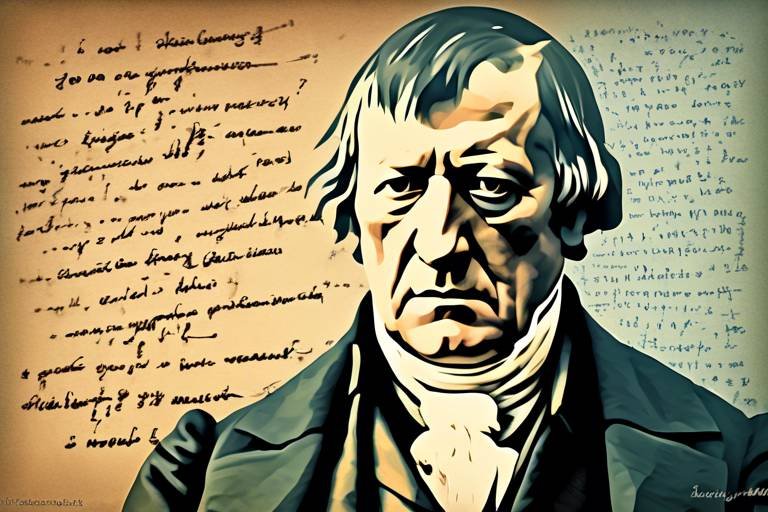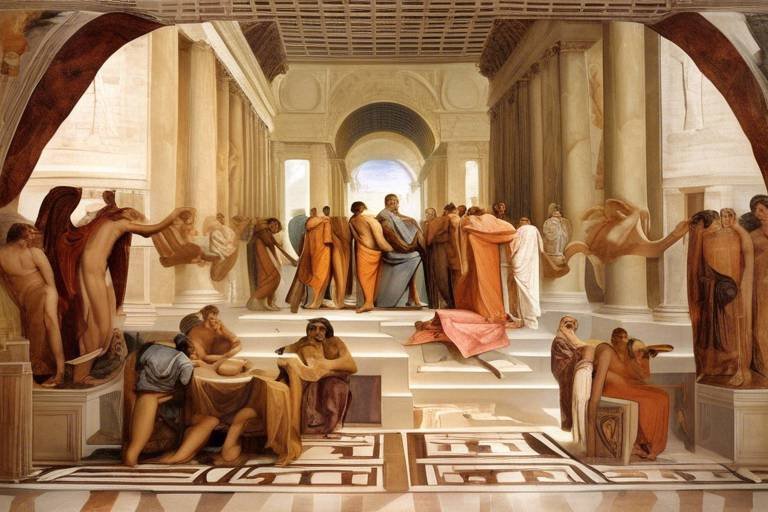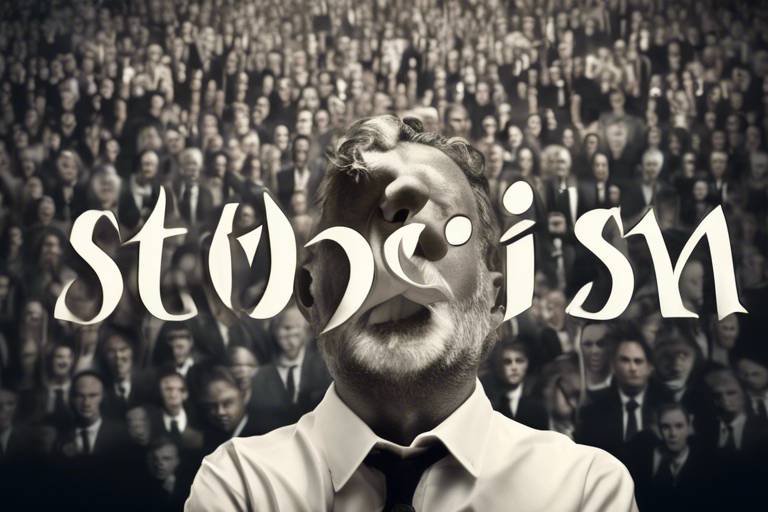The Paradoxes of Zeno - A Philosophical Investigation
This article explores Zeno's paradoxes, their implications on philosophy, mathematics, and the nature of motion, as well as how they challenge our understanding of infinity and continuity. Zeno of Elea, a pre-Socratic philosopher, is best known for his paradoxes that question the very foundation of our understanding of space and time. His arguments are not just intellectual exercises; they provoke a deeper inquiry into the nature of reality itself. As we dive into Zeno's world, we will uncover how his thoughts resonate through the ages, influencing both ancient and modern thinkers alike.
Zeno was born around 490 BCE in the city of Elea, located in present-day Italy. He was a student of the philosopher Parmenides, who argued that reality is unchanging and that all change is an illusion. Zeno's life was shaped by this philosophical backdrop, leading him to develop his paradoxes as a means to defend Parmenides' ideas. His experiences as a young man in a time of political turmoil and intellectual ferment fueled his desire to challenge conventional wisdom. Zeno's paradoxes are not merely abstract concepts; they are deeply rooted in his quest to understand the nature of existence and the limits of human perception.
At the heart of Zeno's work lies a series of paradoxes that challenge our intuitive understanding of motion and change. One of the most famous is the paradox of Achilles and the Tortoise, which highlights the conflict between intuition and reason. Zeno argues that if Achilles races a tortoise that has a head start, he will never be able to overtake it because every time he reaches the point where the tortoise was, the tortoise has moved a little further ahead. This paradox raises profound questions about the nature of distance, time, and the very fabric of reality.
This paradox illustrates the conflict between our intuitive grasp of motion and the logical implications of Zeno's reasoning. It forces us to reconsider how we understand speed and time. Imagine you are in a race; every time you think you are closer to your goal, you find that there’s always a little more distance to cover. This can be both frustrating and enlightening. The paradox compels us to ask: Is motion real, or is it merely an illusion? Zeno's arguments challenge us to rethink our assumptions about how we perceive the world around us.
The implications of the Achilles paradox extend far beyond a simple race. It invites us to explore deeper inquiries into the concepts of space and time. If we accept Zeno's reasoning, we might conclude that motion is impossible. This leads us to consider how we define motion in both philosophical and scientific contexts. Motion, as we perceive it, might just be a convenient construct, a way for us to make sense of a universe that is fundamentally more complex than we can grasp.
Throughout history, mathematicians have grappled with Zeno's paradoxes, leading to significant developments in calculus and the concept of limits. The invention of calculus provided tools to resolve these paradoxes, demonstrating that infinite processes can yield finite results. For instance, when we calculate the distance Achilles covers, we can sum the infinite series of distances he travels. This mathematical approach preserves the philosophical significance of Zeno's challenges while offering a resolution that aligns with our understanding of the physical world.
Another of Zeno's famous paradoxes is the Dichotomy Paradox, which posits that in order to reach a destination, one must first cover half the distance. But before covering that half, one must cover a quarter of the distance, and so on, leading to an infinite number of steps. This paradox raises questions about infinite divisibility and the nature of reality itself. If motion requires traversing an infinite series of distances, can motion ever truly occur? Zeno's paradoxes force us to confront the limits of our understanding and the nature of existence.
Zeno's paradoxes have had a profound influence on various philosophical movements. They sparked discussions around skepticism, existentialism, and modern analytic philosophy, reshaping our understanding of knowledge and existence. Philosophers have been drawn to Zeno's ideas, using them as a springboard to explore the nature of reality, perception, and the limits of human understanding. His work has inspired countless debates, pushing thinkers to confront the complexities of existence.
Philosophers like Aristotle and Kant responded to Zeno's paradoxes, paving the way for future philosophical inquiry. Aristotle, for instance, sought to reconcile Zeno's challenges with his own theories of motion and change. Kant, on the other hand, used Zeno's paradoxes to delve into the nature of time and space, exploring how our perceptions shape our understanding of reality. Zeno's influence is evident in the way subsequent thinkers grappled with the questions he raised, ensuring his legacy endures through the ages.
Today, Zeno's paradoxes continue to hold relevance in contemporary philosophy and science. They invite discussions on infinity, quantum mechanics, and the philosophy of mathematics. As we explore the complexities of the universe, Zeno's challenges remind us of the limitations of human perception and the intricate nature of reality. The conversations sparked by his paradoxes are as vital now as they were in ancient Greece, illustrating the enduring power of philosophical inquiry.
- What are Zeno's paradoxes? Zeno's paradoxes are a set of philosophical arguments that challenge our understanding of motion, space, and time.
- How did Zeno influence modern philosophy? Zeno's paradoxes have influenced various philosophical movements, prompting discussions about reality, perception, and the nature of existence.
- What is the significance of the Achilles and the Tortoise paradox? This paradox illustrates the conflict between intuition and reason, questioning our understanding of motion and distance.
- How have mathematicians resolved Zeno's paradoxes? The development of calculus and the concept of limits have provided mathematical tools to address the challenges posed by Zeno's paradoxes.

The Life of Zeno
Zeno of Elea, a name that resonates through the corridors of philosophy, was born around 490 BCE in the ancient city of Elea, located in what is now southern Italy. He was a student of the philosopher Parmenides, whose ideas profoundly influenced Zeno's own thoughts. Parmenides championed the notion that reality is unchanging and that all change is an illusion, a concept that Zeno sought to defend through his paradoxes. Zeno's life was marked by a quest for understanding the nature of existence, which led him to develop arguments that challenged the very fabric of perception and reason.
Much of what we know about Zeno comes from the works of later philosophers, as his own writings have largely been lost to time. However, fragments of his work, particularly his paradoxes, provide a glimpse into his philosophical inquiries. Zeno's paradoxes were not merely mathematical curiosities; they were deeply rooted in the philosophical debates of his time. He aimed to demonstrate that the beliefs held by the majority—such as the reality of motion and plurality—were fundamentally flawed. This radical approach not only positioned Zeno as a pivotal figure in the realm of philosophy but also as a precursor to the intricate discussions of infinity and continuity that would follow in the centuries to come.
In addition to his philosophical contributions, Zeno's life was steeped in the political and cultural milieu of ancient Greece. The city of Elea was known for its intellectual vibrancy, and Zeno was likely influenced by the rich dialogues and debates that characterized this environment. His arguments often served as a counterpoint to the views of the Sophists, who emphasized relativism and the subjective nature of truth. Zeno's unwavering commitment to rational inquiry and logical consistency set him apart from his contemporaries, establishing a legacy that would inspire future thinkers.
Throughout his life, Zeno faced considerable opposition, particularly from those who found his paradoxes perplexing. His most famous paradoxes—such as the Achilles and the Tortoise—serve as a testament to his ability to provoke thought and challenge conventional wisdom. By illustrating the contradictions inherent in our understanding of motion and distance, Zeno invited his audience to reconsider their assumptions about reality. This willingness to confront established beliefs is perhaps one of Zeno's most enduring qualities, making him a crucial figure in the history of philosophy.
In summary, Zeno of Elea stands as a towering figure in the landscape of philosophical thought. His life, shaped by the teachings of Parmenides and the vibrant intellectual culture of ancient Greece, led him to craft paradoxes that continue to resonate in contemporary discussions. Through his work, Zeno not only defended his mentor's ideas but also laid the groundwork for future explorations into the nature of reality, motion, and existence itself.

Understanding Zeno's Paradoxes
Zeno of Elea, a philosopher from ancient Greece, crafted a series of thought experiments known as paradoxes that have perplexed thinkers for centuries. These paradoxes are not just mere riddles; they challenge our fundamental understanding of motion, space, and time. At the heart of Zeno's arguments lies a deep-seated conflict between intuition and reason, which forces us to reevaluate how we perceive the world around us. By presenting scenarios that defy our common sense, Zeno invites us to explore the limits of our understanding and the implications of infinity.
One of the most famous paradoxes, the Achilles and the Tortoise, illustrates this conflict vividly. Imagine a race between the swift Achilles and a slow-moving tortoise. Zeno posits that if Achilles gives the tortoise a head start, he will never be able to overtake it. Why? Because every time Achilles reaches the point where the tortoise was, the tortoise will have moved a little further ahead. This seemingly absurd conclusion challenges our perception of motion and distance, leading us to question whether motion is truly possible at all.
To grasp the significance of Zeno's paradoxes, we must delve into the implications they hold for our understanding of infinity and continuity. Zeno's arguments suggest that if space and time can be divided into infinitely smaller segments, then motion becomes an impossible task. This idea resonates with the concept of infinite divisibility, where one must traverse an endless number of points before reaching a destination. The paradoxes force us to confront the notion that our intuitive understanding of distance and motion might be fundamentally flawed.
Moreover, Zeno's paradoxes have inspired countless discussions among philosophers and mathematicians alike. They have acted as a catalyst for the development of mathematical concepts such as limits and convergence, which were essential in the formulation of calculus. Through these advancements, thinkers have sought to reconcile the paradoxes with a more rigorous mathematical framework, illustrating how Zeno's ideas continue to influence modern thought.
In summary, Zeno's paradoxes serve as a profound reminder of the complexities inherent in our understanding of the universe. They challenge us to question our assumptions and to seek deeper insights into the nature of reality. As we continue to explore these paradoxes, we uncover layers of meaning that extend far beyond the realm of philosophy, touching upon mathematics, physics, and even the very fabric of existence itself.
- What are Zeno's paradoxes? Zeno's paradoxes are a set of philosophical arguments that challenge our understanding of motion, space, and time, primarily through thought experiments.
- Why are Zeno's paradoxes important? They encourage critical thinking about concepts like infinity and continuity, and they have significantly influenced both philosophy and mathematics over the centuries.
- How did mathematicians resolve Zeno's paradoxes? Through the development of calculus and the concept of limits, mathematicians found ways to address the challenges posed by Zeno while preserving their philosophical significance.

The Achilles and the Tortoise Paradox
The Achilles and the Tortoise paradox is one of the most famous thought experiments in philosophy, and it serves as a fascinating lens through which we can examine our understanding of motion and distance. Imagine, if you will, a race between the swift Achilles and a slow-moving tortoise. To make things interesting, let’s say Achilles gives the tortoise a head start of 100 meters. At first glance, it seems obvious that Achilles, known for his speed, will easily overtake the tortoise. However, Zeno presents a compelling argument that challenges this intuition.
As Achilles begins to run, he reaches the point where the tortoise started. But by the time he gets there, the tortoise has moved a little further ahead. This leads to a series of events where Achilles must reach the tortoise's previous position, only to find that the tortoise has advanced yet again. This cycle continues infinitely, suggesting that Achilles will never actually catch up to the tortoise. It’s a mind-bending scenario that raises questions about the nature of motion and the concept of infinity.
What makes this paradox particularly intriguing is the way it juxtaposes intuitive understanding with mathematical reasoning. On one hand, our intuition tells us that Achilles should win the race without any contest. On the other hand, Zeno’s reasoning implies that there are infinite points Achilles must reach before he can overtake the tortoise. This leads us to ponder: Is motion merely an illusion? Are we trapped in a world of infinite divisions that prevent us from achieving what seems so straightforward?
To delve deeper into the implications of this paradox, we must consider the following points:
- Infinite Divisibility: Zeno's paradox suggests that space and time can be divided infinitely, which challenges our conventional understanding of reality.
- Concept of Limits: This paradox laid the groundwork for the development of calculus, where mathematicians learned to deal with infinite series and limits, providing a resolution to the paradox while preserving its philosophical significance.
- Nature of Speed: The paradox prompts discussions about how we perceive speed and motion, leading to deeper inquiries into the fabric of reality itself.
In essence, the Achilles and the Tortoise paradox invites us to engage with fundamental questions about existence and perception. It forces us to confront the limitations of human understanding when faced with the complexities of infinity. This paradox not only challenges our views on motion but also serves as a reminder of the intricate relationship between philosophy and mathematics. As we explore these ideas, we find ourselves navigating a landscape where the boundaries of knowledge blur, leaving us with more questions than answers.

Implications for Motion
The implications of Zeno's paradoxes, particularly the Achilles and the Tortoise paradox, extend far beyond mere philosophical musings. They challenge our fundamental understanding of motion, space, and time, forcing us to reconsider how we perceive these concepts in our daily lives. Imagine trying to run a race where every time you reach a certain point, you have to cover half the remaining distance. It sounds absurd, right? Yet, this is precisely the conundrum Zeno presents. The paradox suggests that if you can always divide the distance into smaller segments, motion becomes an impossibility. This notion raises profound questions: What does it mean to be in motion? Are we merely traversing an infinite number of points, or is there a finite experience of movement?
To illustrate, let’s break down the implications of this paradox on our understanding of motion:
- Infinite Divisibility: Zeno's paradox leads us to confront the idea that distance can be infinitely divided. If every segment can be halved, how do we ever complete a journey? This challenges our intuitive grasp of moving from point A to point B.
- Concept of Time: The paradox also prompts us to think about time's role in motion. If motion requires passing through an infinite number of points, does that mean time itself is similarly infinite? How do we measure time in the context of motion?
- Real vs. Perceived Motion: The distinction between actual motion and perceived motion becomes blurred. Are we truly moving, or is our experience of motion just an illusion created by our perception of time and space?
These challenges have led to significant philosophical and scientific inquiries. For instance, the development of calculus, particularly the concept of limits, emerged as an attempt to reconcile these paradoxes with mathematical rigor. By understanding that we can approach a limit without necessarily reaching it, mathematicians found a way to navigate through Zeno's seemingly insurmountable challenges. This intersection of philosophy and mathematics illustrates how deeply interconnected these fields are, as they both seek to understand the nature of reality.
In conclusion, Zeno's paradoxes not only provoke thought about the mechanics of motion but also encourage a broader reflection on existence itself. They compel us to examine the very fabric of reality, urging us to question our assumptions and explore the depths of infinity and continuity. As we move forward, the implications of Zeno's work continue to resonate, inviting both philosophical and scientific exploration into the nature of motion and our understanding of the universe.

Mathematical Interpretations
When we dive into Zeno's paradoxes, we find ourselves in a fascinating intersection of philosophy and mathematics. Zeno's challenges to our understanding of motion and space have not only sparked debate among philosophers but have also prompted mathematicians to think critically about the foundations of their discipline. One of the most significant contributions to resolving Zeno's paradoxes came with the development of calculus in the 17th century. Calculus introduced the concept of limits, which provided a mathematical framework to deal with the infinite divisions of space and time that Zeno so provocatively presented.
To grasp how calculus helps us navigate Zeno's paradoxes, let’s consider the famous Achilles and the Tortoise paradox. In this scenario, Achilles races a tortoise that has a head start. Zeno argues that Achilles can never overtake the tortoise because every time he reaches the point where the tortoise was, the tortoise has moved a little further ahead. This seemingly endless chase illustrates the conflict between our intuitive understanding of motion and the logical implications of infinite divisibility.
Mathematically, we can express this paradox using a series. If we denote the distance Achilles needs to run to catch the tortoise as a sum of infinite series, we can represent the distances Achilles covers as:
| Step | Distance Covered by Achilles | Distance Remaining for the Tortoise |
|---|---|---|
| 1 | 10 meters | 20 meters |
| 2 | 5 meters | 10 meters |
| 3 | 2.5 meters | 5 meters |
| 4 | 1.25 meters | 2.5 meters |
| 5 | 0.625 meters | 1.25 meters |
As we continue this pattern, the distances Achilles covers form a geometric series. The sum of this infinite series converges to a finite limit, allowing us to mathematically demonstrate that Achilles will indeed overtake the tortoise. This convergence is a crucial aspect of calculus, which allows us to handle infinite processes and understand motion in a rigorous way.
Furthermore, Zeno's paradoxes have also prompted the exploration of the concept of continuity in mathematics. The idea that there can be infinitely many points between any two points leads to profound implications in calculus and real analysis. Mathematicians like Newton and Leibniz, who independently developed calculus, were able to provide tools to analyze motion and change that Zeno's paradoxes had brought to light centuries earlier.
In conclusion, Zeno's paradoxes serve as a catalyst for mathematical inquiry, pushing the boundaries of our understanding of space, time, and motion. The interpretations that arise from these paradoxes not only enrich philosophical discourse but also lay the groundwork for modern mathematics. As we continue to explore these ideas, we find that the interplay between philosophy and mathematics remains as vibrant and relevant today as it was in ancient Greece.
- What is Zeno's paradox? Zeno's paradoxes are a set of philosophical problems formulated by Zeno of Elea, which challenge our understanding of motion, space, and time.
- How did calculus resolve Zeno's paradoxes? Calculus, through the concept of limits, provides a mathematical framework to understand infinite processes and shows how Achilles can indeed overtake the tortoise.
- Why are Zeno's paradoxes still relevant today? They continue to influence discussions in philosophy, mathematics, and even physics, particularly in areas like quantum mechanics and the philosophy of infinity.

The Dichotomy Paradox
The Dichotomy Paradox, one of Zeno's most intriguing arguments, presents a fascinating challenge to our understanding of motion. Imagine you're about to embark on a journey to a destination that seems just a stone's throw away. However, before you can reach your goal, you must first cover half the distance. Sounds simple, right? But here’s where Zeno's paradox kicks in: before you can reach that halfway point, you must first traverse half of that distance, and so on, ad infinitum. This leads to the conclusion that you can never actually reach your destination because there will always be another halfway point to conquer. It's like trying to catch a mirage; the closer you get, the further it seems to slip away.
This paradox not only raises questions about motion but also dives deep into the concept of infinite divisibility. If we dissect the distance into infinitely smaller segments, can we truly say that motion is possible? Zeno’s argument suggests that if one must always reach a midpoint before moving forward, then the act of moving itself becomes an impossibility. It challenges our intuitive grasp of reality, forcing us to confront the uncomfortable idea that our perceptions of space and time might be fundamentally flawed.
To further illustrate the complexity of the Dichotomy Paradox, consider the following table that summarizes the infinite steps involved in reaching a destination:
| Step | Distance Covered | Remaining Distance |
|---|---|---|
| 1 | 1/2 | 1/2 |
| 2 | 1/4 | 1/4 |
| 3 | 1/8 | 1/8 |
| 4 | 1/16 | 1/16 |
| ... | ... | ... |
As this table illustrates, each step brings you closer to your destination, yet you can see that there remains an infinite number of divisions to traverse. This paradox not only highlights the limitations of our physical understanding but also beckons deeper philosophical inquiry. Are we merely observing an illusion of motion? Is reality itself a construct of our perceptions?
In essence, the Dichotomy Paradox serves as a catalyst for profound discussions about the nature of reality and existence. It invites us to question not just how we move through space, but also how we comprehend the very fabric of time. This paradox has implications that reach far beyond philosophy; it resonates within the realms of physics and mathematics, where the concepts of limits and continuity are essential. So, the next time you take a step, remember Zeno and the paradox that makes you ponder whether you’re truly moving at all.
- What is the Dichotomy Paradox? It is a philosophical argument that suggests motion is impossible because one must always reach the halfway point before moving forward.
- How does this paradox relate to infinity? The paradox relies on the idea of infinite divisibility, where each segment of distance can be divided infinitely, preventing the completion of motion.
- What are the implications of this paradox in modern science? The Dichotomy Paradox influences discussions in quantum mechanics and the philosophy of mathematics, challenging our understanding of space and time.

The Impact on Philosophy
The impact of Zeno's paradoxes on philosophy is nothing short of profound. These paradoxes have stirred the pot of philosophical inquiry for centuries, challenging thinkers to grapple with the fundamental nature of reality, motion, and existence itself. Imagine being confronted with a seemingly simple assertion about motion, only to find that it spirals into a labyrinth of questions about the very fabric of our understanding. Zeno's work has not only influenced ancient philosophers but has also echoed through the halls of modern thought, shaping various philosophical movements.
One of the most significant impacts of Zeno's paradoxes is their role in the development of skepticism. By questioning the coherence of motion and distance, Zeno invites us to reconsider our intuitive beliefs. This skepticism is not merely a rejection of knowledge but rather a profound inquiry into what we can truly know. In this way, Zeno's paradoxes serve as a catalyst for deeper philosophical exploration, pushing thinkers to refine their arguments and examine the limits of human understanding.
Moreover, Zeno's paradoxes have found their way into existentialism, where the focus on individual experience and the nature of existence resonates with the challenges posed by his arguments. The notion that motion can be dissected into infinite segments raises questions about the continuity of experience and the essence of being. It's as if Zeno is holding a mirror to our perceptions, revealing the complexities that lie beneath the surface of our everyday experiences.
In the realm of modern analytic philosophy, Zeno's paradoxes continue to inspire debate and discussion. Philosophers like Bertrand Russell and Ludwig Wittgenstein have revisited these paradoxes, using them as a springboard to explore the nature of language and meaning. The paradoxes challenge us to think critically about how we articulate our thoughts on motion and time, revealing the intricate relationship between language and reality. This interplay is crucial, as it underscores the limitations of our linguistic constructs in capturing the essence of philosophical concepts.
To illustrate the far-reaching influence of Zeno's paradoxes, consider the following table that highlights key philosophical movements and their responses to Zeno's ideas:
| Philosophical Movement | Response to Zeno's Paradoxes |
|---|---|
| Skepticism | Challenges the certainty of knowledge about motion and distance. |
| Existentialism | Explores the implications of infinite divisibility on human experience. |
| Modern Analytic Philosophy | Examines the relationship between language, meaning, and reality. |
In contemporary discussions, Zeno's paradoxes have found relevance in the fields of quantum mechanics and the philosophy of mathematics. As scientists delve into the bizarre world of quantum phenomena, the questions raised by Zeno resonate with the challenges of understanding particles that exist in superpositions or can be in multiple states simultaneously. Similarly, mathematicians grapple with concepts of infinity and continuity, often referencing Zeno's work as a historical touchstone that highlights the complexity of these ideas.
Overall, Zeno's paradoxes serve as a philosophical touchstone that continues to inspire inquiry and debate. They remind us that the questions surrounding motion, time, and reality are not merely academic; they touch on the very essence of our existence. By engaging with Zeno's challenges, we embark on an intellectual journey that not only enriches our understanding of philosophy but also deepens our appreciation for the mysteries of life.
- What are Zeno's paradoxes? Zeno's paradoxes are a set of philosophical problems formulated by Zeno of Elea that challenge our understanding of motion, space, and time.
- How did Zeno's paradoxes influence modern philosophy? They prompted significant discussions about skepticism, the nature of existence, and the relationship between language and reality.
- Are Zeno's paradoxes relevant today? Yes, they continue to influence contemporary discussions in philosophy, mathematics, and science, particularly in areas like quantum mechanics.

Influence on Later Philosophers
Zeno's paradoxes have left an indelible mark on the landscape of philosophy, influencing a myriad of thinkers across centuries. His challenges to the nature of motion and infinity ignited a spark that prompted philosophers such as Aristotle and Kant to wrestle with the implications of his arguments. Aristotle, for instance, sought to address Zeno's paradoxes by proposing a more nuanced understanding of motion. He argued that while Zeno's paradoxes might seem compelling, they arise from a misunderstanding of the nature of time and space. Aristotle introduced the concept of actual infinities versus potential infinities, suggesting that while there may be infinitely many points in a line, one does not need to traverse each point to achieve motion.
Moreover, Kant took Zeno's challenges even further, integrating them into his own philosophical inquiries about space and time. He posited that space and time are not merely frameworks within which events occur but are fundamental aspects of human perception. In his Critique of Pure Reason, Kant argued that our understanding of motion is inherently tied to our cognitive faculties, suggesting that Zeno's paradoxes reveal more about human perception than about the physical world itself. This shift in perspective was crucial, as it opened up discussions about the relationship between reality and perception, a theme that resonates in modern philosophy.
The influence of Zeno's paradoxes extends beyond ancient philosophers. In the realm of modern philosophy, thinkers such as Bertrand Russell and Gottlob Frege have revisited these paradoxes in the context of logic and mathematics. Russell, for example, used Zeno's paradoxes to illustrate the complexities of set theory and the nature of infinity. He argued that Zeno's insights challenge the very foundations of mathematical reasoning, pushing for a deeper exploration of how we define and understand infinite sets.
In contemporary discussions, Zeno's paradoxes continue to resonate within the fields of quantum mechanics and the philosophy of mathematics. The paradoxes raise questions about the nature of reality at the quantum level, where traditional notions of motion and causality are constantly being challenged. Philosophers today grapple with the implications of Zeno's work, as it forces them to reconsider the boundaries of knowledge and existence in a universe that often defies our intuitive understanding.
In summary, Zeno's paradoxes have acted as a catalyst for philosophical inquiry, prompting profound reflections on the nature of reality, perception, and knowledge. The dialogues sparked by his work have shaped the trajectory of philosophical thought, leading to rich discussions that continue to unfold in modern contexts. As we navigate the complexities of motion, time, and infinity, Zeno's legacy remains a powerful reminder of the intricate dance between intuition and reason.
- What are Zeno's paradoxes? Zeno's paradoxes are a set of philosophical problems that challenge our understanding of motion, space, and time, most famously illustrated by the paradox of Achilles and the tortoise.
- How did Aristotle respond to Zeno's paradoxes? Aristotle addressed Zeno's paradoxes by distinguishing between actual and potential infinities, arguing that motion can occur despite the infinite divisibility of space.
- What is the modern relevance of Zeno's paradoxes? Zeno's paradoxes continue to influence contemporary discussions in philosophy and science, particularly in the realms of quantum mechanics and the philosophy of mathematics.

Modern Relevance
The relevance of Zeno's paradoxes stretches far beyond the ancient world, echoing through the corridors of modern philosophy and science. In today’s discussions, these paradoxes challenge our understanding of infinity and continuity, pushing the boundaries of how we perceive motion and reality. For instance, consider how quantum mechanics has revolutionized our understanding of particles and their movements. Just as Zeno proposed that motion is an illusion, quantum physics suggests that particles exist in probabilities rather than definitive states. This intersection between Zeno’s thoughts and modern science raises the question: Are we merely observing a façade of motion, or is there something deeper at play?
Moreover, Zeno's paradoxes have sparked lively debates in the realm of mathematics, particularly in calculus. The concept of limits, which is foundational to calculus, offers a mathematical resolution to Zeno's challenges. Yet, even with these advancements, the philosophical implications remain potent. The idea that one can infinitely divide space and time leads to profound inquiries about the very fabric of reality. Are we living in a world governed by discrete events, or is everything a continuous flow? This dilemma is akin to trying to grasp a river; the moment you think you have it, it slips away.
In addition, Zeno's paradoxes have found their place in contemporary philosophical discussions, particularly in the fields of existentialism and analytic philosophy. The questions they raise about perception and reality resonate with modern thinkers who grapple with the nature of existence. Are we truly moving forward in time, or are we simply experiencing a series of static moments? This inquiry reflects the existential struggle to find meaning in a world that often feels paradoxical.
To illustrate the ongoing influence of Zeno's ideas, consider the following table that summarizes the modern interpretations of his paradoxes:
| Paradox | Modern Interpretation | Field of Impact |
|---|---|---|
| Achilles and the Tortoise | Challenges our understanding of motion and speed | Physics, Mathematics |
| Dichotomy Paradox | Questions the nature of infinite divisibility | Philosophy, Mathematics |
| Arrow Paradox | Explores the concept of time as discrete vs. continuous | Philosophy, Quantum Mechanics |
In conclusion, Zeno's paradoxes are not just relics of philosophical history; they are vibrant topics that continue to inspire inquiry and debate in today's world. As we delve deeper into the realms of mathematics, science, and philosophy, Zeno's work serves as a reminder that some questions may never have definitive answers, yet they are essential for our intellectual journey. The next time you ponder the nature of motion or the concept of infinity, remember that Zeno's paradoxes are there, challenging you to think deeper and question the very essence of your reality.
- What are Zeno's paradoxes? Zeno's paradoxes are a set of philosophical problems that challenge our understanding of motion and infinity, most famously illustrated through the Achilles and the Tortoise paradox.
- How do Zeno's paradoxes relate to modern physics? They raise questions about the nature of movement and reality, which resonate with concepts in quantum mechanics and the philosophy of space and time.
- What is the significance of Zeno's paradoxes in mathematics? They have influenced the development of calculus and the concept of limits, providing a mathematical framework to address the challenges posed by his arguments.
Frequently Asked Questions
- What are Zeno's paradoxes?
Zeno's paradoxes are a set of philosophical problems formulated by Zeno of Elea in the 5th century BC. They challenge our understanding of motion and infinity, presenting scenarios where common intuitions about distance and speed lead to seemingly contradictory conclusions. The most famous of these paradoxes include the Achilles and the Tortoise and the Dichotomy paradox.
- How do Zeno's paradoxes affect our understanding of motion?
Zeno's paradoxes force us to reconsider the nature of motion itself. For instance, the Achilles and the Tortoise paradox suggests that if Achilles can never overtake the tortoise, then motion is impossible. This leads to deeper inquiries about how we perceive distance and time, ultimately questioning whether our intuitions about movement align with mathematical reality.
- What is the significance of the Achilles and the Tortoise paradox?
This paradox illustrates the conflict between our intuitive understanding of speed and the mathematical implications of infinite divisibility. It shows that while Achilles seems faster, the paradox reveals that he must first reach the point where the tortoise started, creating an infinite series of tasks. This challenges both philosophers and mathematicians to explore concepts of limits and continuity.
- How have mathematicians resolved Zeno's paradoxes?
Mathematicians have tackled Zeno's paradoxes through the development of calculus, particularly the concept of limits. By understanding that infinite series can converge to a finite value, they have provided a mathematical resolution to the paradoxes while acknowledging their philosophical significance. This interplay between mathematics and philosophy continues to inspire debate and inquiry.
- What impact have Zeno's paradoxes had on modern philosophy?
Zeno's paradoxes have significantly influenced various philosophical movements, prompting discussions in skepticism, existentialism, and modern analytic philosophy. They challenge our understanding of knowledge, existence, and reality, pushing philosophers to explore the implications of infinity and the nature of perception in our understanding of the universe.
- How did later philosophers respond to Zeno's paradoxes?
Philosophers like Aristotle and Kant engaged deeply with Zeno's paradoxes, offering critiques and alternative perspectives. Aristotle, for instance, proposed solutions regarding motion and time that laid the groundwork for future philosophical inquiry. These responses have shaped ongoing debates about the nature of reality and how we comprehend existence.
- Are Zeno's paradoxes still relevant today?
Absolutely! Zeno's paradoxes continue to resonate in contemporary discussions about infinity, quantum mechanics, and the philosophy of mathematics. They challenge our understanding of the physical world and encourage exploration into the foundational principles of reality, making them a timeless subject of philosophical investigation.



















